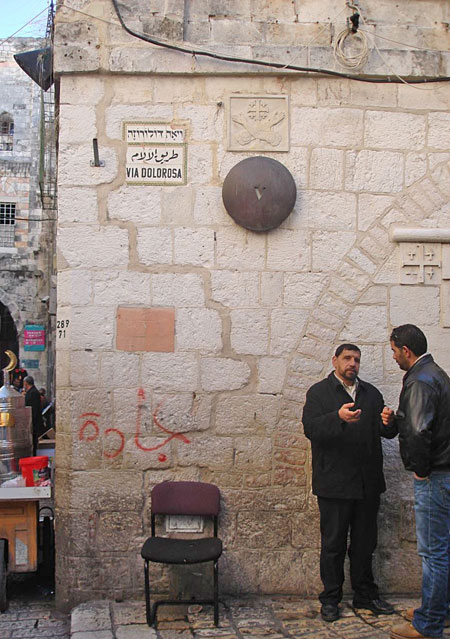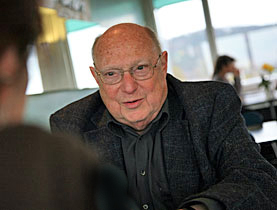Palestinians mark 60 years since their “Nakba”

As Israelis celebrate 60 years since their country's founding on Wednesday, streets and buildings are festooned with blue and white flags with the Star of David.
For their Palestinian neighbours it is a time of very different memories. swissinfo spoke to a young Palestinian woman in Jerusalem about her family life, hopes and fears 60 years on from what they call Al Nakba or “the catastrophe”.
“I remember there were always fireworks at this time of year when I was a child,” says Shireen Bakleh (not her real name). “We would ignore them and I never knew what they celebrated.
“My parents never told me. It was a bit like finding out about Santa. They didn’t want to tell me that those fireworks celebrated our demise. They wanted me to have a normal happy childhood.”
An estimated 700,000 to 900,000 Palestinians fled their homes in Palestine during the Nakba between June 1946 and the official end of the Arab-Israeli war in January 1949. Today, there are 4.5 million registered refugees, descendents of these original refugees, living in the Middle East.
Bakleh’s family were among the luckier ones. Her mother’s family continued to live in Haifa when that city became part of Israel, where her grandfather ran a tailor’s business until his death last year at the age of 87.
They became what is officially called Israeli Arabs, a term Bakleh dislikes. They have Israeli citizenship and passports but they remain Palestinian and, she says, are second-class citizens in Israel.
Her father’s family had to abandon their house in Israel in 1948. An apartment building now stands on the site of their old house, but the tree that her uncle planted still stands and the family sometimes visit it.
Bakleh’s father has a laissez passer, or travel document that has to be renewed every couple of years meaning that while he is a resident of Jerusalem, he has no citizenship.
As an Israeli-Arab, Bakleh has an Israeli passport meaning that she has freedom to travel, unlike the 1.3 million third-generation Palestinian refugees in camps in the West Bank, Gaza, Jordan, Syria and Lebanon.
“Denial of history”
Bakleh believes that the Palestinians’ tragedy lies in Israel’s denial of history and the population’s lack of awareness and understanding of Palestinian history and culture.
Israelis are educated to believe that this is their land, and that it was an empty land before they arrived. “A land without people for a people without land” was the slogan of Zionist leader Israel Zangwill, and it is one that still reverberates today.
Bakleh went to a private Catholic school in East Jerusalem, attended by Christian and Muslim Palestinians. Her Arabic history books, part of the then-approved Israeli curriculum, made no reference to Palestinian history or to the Israeli-Palestinian conflict.
She learnt about her own history from the stories her parents and grandparents told, and the comments of a history teacher who dared speak off the record.
Tail and horns
Her mother was born in Haifa in 1948. “When she was a baby two Jewish women came to the house and started pulling at her hair and looked into her nappy. Jews were taught that Arabs had a tail and horns and they wanted to see for themselves.”
For Bakleh this family tale symbolises much of what’s wrong with Israel today. Arabs are demonised in the press and in popular culture, both in Israel and the West. They are seen as an impoverished uneducated and violent people, an image reinforced by the suicide bombings during the Second Intifada or uprising.
Bakleh has little time for the many aid programmes that have sprung up as part of the peace process to try to bring Israelis and Palestinians together. They do not deal with the real problems and the obstacles that Palestinians face when trying to live normal lives, she says.
Israel occupies 40 per cent of the West Bank. Israeli settlements – illegal under international law – military bases, road networks, and hundreds of checkpoints and roadblocks fragment the Palestinian territory.
Blockade
An eight-metre high separation barrier which Israel commenced building in 2005 will eventually stretch along 700km of the West Bank’s most fertile land. This barrier has further restricted Palestinian lives, cutting them off their land, their families, their livelihoods and water supplies.
In the Gaza Strip, 1.4 million Palestinians have been living under an Israeli blockade since the militant organisation Hamas took over power in June of last year.
As President Bush visits Jerusalem for the second time this year, Bakleh believes that the most insurmountable obstacle in Israeli-Palestinian peace talks has not been addressed.
“From a young age, Israelis are taught to be afraid of all Arabs and Palestinians, and to fear that their country will be attacked.
“This fear factor is the greatest weapon in Israel’s arsenal, not its nuclear power,” she says.
swissinfo, Victoria Bruce in Jerusalem
The state of Israel was established during the war that the Israelis call the War of Independence and the Palestinians call the Nakba. War between the Israelis and the Arabs of Palestine and the neighbouring Arab states broke out following the UN resolution of November 29, 1947 that voted in favour of the partition of Palestine and the establishment of separate Jewish and Arab states.
The population of Israel today is 7.82 million, and 20% of the population are Arabs. 3.8 million Palestinians live in the West Bank and the Gaza Strip. In 2007, 450,000 Israeli settlers lived in 149 settlements in the West Bank, including East Jerusalem.
Israel pulled out of Gaza in 2005, but has enforced a blockade on Gaza since June 2007 following the election of the militant organisation Hamas. Israel says this is to put a stop to Hamas rocket attacks on Israeli cities.
Israeli restrictions have had a major effect on Palestinian life in the West Bank and Gaza. Palestinians are not permitted to use the extensive network of roads that crisscross the West Bank, and the construction of the security barrier has further curtailed their freedom of movement leading to a severe deterioration in socio-economic conditions.
The West Bank has few natural resources and its economy depends on trade and remittances from jobs in Israel. An estimated 23.4% of West Bankers are unemployed. The Gaza economy has collapsed with 70% of the population living on UN food aid.
Today, 80% of Palestine refugees in Gaza and the West Bank live below the poverty line, compared with 20% in 2000.
The latest round of Middle East peace talks was launched at the Annapolis Conference on November 27, 2007 and was attended by Palestinian President Mahmoud Abbas and Israeli Prime Minister Ehut Olmert. The conference was significant in that a two-state solution was agreed upon for the Israeli-Palestinian conflict for the first time. President Bush has stated that he wants to conclude an agreement before the end of 2008.

In compliance with the JTI standards
More: SWI swissinfo.ch certified by the Journalism Trust Initiative

You can find an overview of ongoing debates with our journalists here. Please join us!
If you want to start a conversation about a topic raised in this article or want to report factual errors, email us at english@swissinfo.ch.